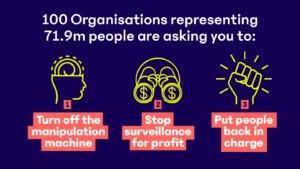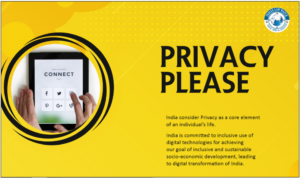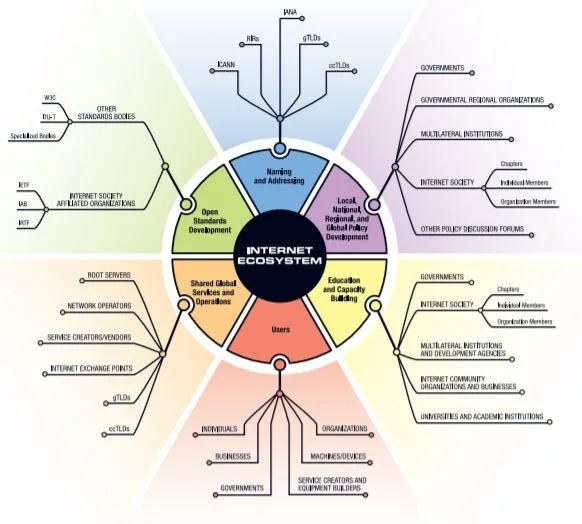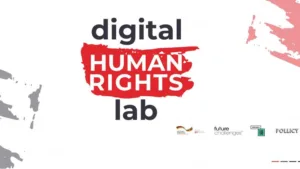
Digital Space and Human Rights

TABLE OF CONTENT
| SR.NO. | TOPIC |
| 1 | Introduction |
| 2 | Digital privacy and human rights |
| 3 | Special rapporteur on rights of privacy |
| 4 | Multistate holder internet governance |
| 5 | Conceptualization of human rights protection as a national security priority |
| 6 | Conclusion |

INTRODUCTION
The spread of hate speech and misinformation online is accelerating. Journalists, politicians, and human rights defenders are constantly monitored and affected by cyber attacks. It is reported that Pegasus spyware is used in 45 countries, mostly in complete secrecy and outside of any legal framework.
Responding to these concerns is very difficult because the regulation of communications always possesses a risk to the protection of free advertising. To give you some numbers: In the past two years alone, my office has noted that more than 60 countries have passed or are considering new laws regarding social media.
Many of these regulations are problematic, cause excessive restrictions, and undermine important rights.
Internet and media censorship is on the rise around the world, including in Europe. These effects affect everyone, as many countries take such measures.
The protection of human rights and freedoms has become more important than ever in the digital age. My office has identified three key points that are critical to making progress in this direction. First, protecting our right to participate is central to protecting freedom. Civil society plays an important role in this –
It should participate in the development of laws, regulations, and other measures related to digital technologies and cyberspace. Journalists and social actors must open and access the online space without surveillance and censorship. Governments and online companies have a responsibility to check this and ensure that we get support if there is a threat.
Digital technologies offer new ways to defend, protect and enforce human rights and affect all forms of civil and political, cultural, economic, and relational rights. They created ways for people to access and share knowledge, form ideas, discuss, and inspire.
They transformed the ‘public square’. But they are used to limit, restrain and break the law equally through surveillance, censorship, online violence, algorithmic bias, and automated decision-making, for example. Illegal technology use continues to negatively affect individuals and groups, leading to inequality and discrimination online and offline.

Second, the right to freedom of expression must be protected both online and offline and coordinated with online opposition to speech and expression. While social media offers unique opportunities to connect with others and encourage public discussion, we recognize that companies do not respond well to users’ concerns, vision, and business issues and that the government does not abide by the rules governing the rights of this place.
DIGITAL PRIVACY AND HUMAN RIGHTS
Digital technology does not exist in a vacuum. They can be a powerful tool for the advancement of humanity and contribute to the promotion and protection of human rights.
But information technologies such as artificial intelligence applications are helping to create a digital environment in which governments and companies can monitor, analyze, predict, and even control human behavior on an unprecedented scale. If used without appropriate safeguards, these technologies pose serious risks to human dignity, freedom, and privacy, and human abuse, the law in general.
Not a single political, social, or legal institution has been affected by this change, our understanding of protecting and respecting human rights has been greatly affected. The human rights movement needs to embrace the digital reality in which we do business. Here are three effective steps.

SPECIAL RAPPORTEUR ON RIGHTS OF PRIVACY
The first step in protecting human rights in the digital space is to gather international support for the creation of a “special expert” (actually an expert in international human rights law). In March, the right to privacy is being discussed at the next meeting of the UN Human Rights Council in Geneva. The United Nations General Assembly (UNGA), led by Brazil and Germany, passed a resolution on privacy in the digital age on December 18 in New York.
The idea behind it is simple: when everything you say or do can be watched and influenced, it can affect what you say, where you go, and what you choose to meet up with.
These concerns underlie the work of human rights activists and defenders around the world. UN General Assembly resolutions reflect international concern about the human rights costs and consequences of many investigations conducted without interference, including interference with
freedom of disclosure, information gathering, and participation. The resolution invited members of the Human Rights Council in Geneva to consider creating a special mechanism for the rights holder to address these international concerns and thus overcome the challenge of protecting privacy in the digital environment.
Ideally, this policyholder will work to challenge the impact of digital communication technology on privacy and help respect the law and provide protection that blocks human rights and fundamental freedoms in the digital environment. The international community should support the establishment of this important international mission.
MULTI STAKE-HOLDER INTERNET GOVERNANCE

A second step that can be taken to strengthen the promotion of human rights in the digital environment is to encourage the further development of a multistakeholder approach to Internet governance.
The Internet itself facilitates the exercise of rights in many ways, but it also leads to a greater division of government into nonstate actors. The Internet was born from the collaboration of technologists and various stakeholders, works across borders through global connections, and is not bound by borders, the boundary of space. In fact, the Internet is influencing the nation-state system that is central to the “Westphalian” model of the UN.
Regionalism based on national governance is put to the test, while people are empowered by global connectivity and free cross-border information. In response, some governments, particularly the Chinese government, have promoted the concept of Internet sovereignty, in which each country has control over all aspects of Internet infrastructure, information, content, and management within its borders.
This approach is used in efforts to West publicize the world Internet and preserve the distribution model, the distribution of many stakeholders of global Internet governance. In order to meet this challenge, the model for Internet governance needs to be preserved and strengthened.
The main idea behind the model is that the government alone cannot decide the way or the law of the internet. The Internet has developed with the cooperation and decisions of many nongovernmental organizations and the opening of the Internet and the work of interoperability depend on the continuous cooperation of many people, especially professionals, involved in the administration of the Internet.
When it comes to human rights law, nongovernmental organizations working to protect and promote human rights are best to join the government, experts, private companies, and others in building the Internet governance that matters in the human rights world in the digital world sphere.
CONCEPTUALIZATION OF HUMAN RIGHTS PROTECTION AS A NATIONAL SECURITY PRIORITY
We need to reach an international agreement that the protection of human rights and respect for the rule of law in the digital field is essential for the security of the country and the world, not against the security of the country and the world.
In a post-Snowden context, national security interests are often ambivalent to considerations of freedom and privacy, as if there was only a positive relationship between human rights and security in the country.
In fact, since the establishment of the United Nations after World War II, the protection of human rights has been an important pillar of the world’s security architecture. The recent failure to adequately protect human rights and respect the rule of law in the digital space has damaged some important aspects of long-term national and international security.
One of the biggest consequences of mass surveillance, uncovered by Edward Snowden, is a breach of the digital security of users, data, and network rules from the protection of national security.
This is ironic and ironic because digital security is now the foundation of national security – whether it’s to protect important systems, confidential data, or sensitive information. Practices such as infiltrating networks, requiring the return of encrypted services, and weakening world encryption standards directly affect national and international security, security, and human rights.
Meanwhile, targeted malware and carefully crafted digital attacks on human rights activists have become the way of working for political governments aimed at undermining human rights efforts. Civil society actors face attacks on computer espionage by governments and other actors such as
cyber militias, such as businesses, and governments. So, as our concept of privacy evolves with social media and data collection technology, we also need to understand that it is not “privacy” that is affected by the digitization of everything.
When the state uses the new resources made possible by digitalization without taking into account human rights, the exercise of all fundamental freedoms is hindered.
In addition, the government creates and encourages bottom
up competition for hackers by implementing strategies that enhance the digital security of individuals, networks, and information. Practices that lead to digital security will be scrutinized and followed by government and non-state actors, ultimately affecting the security of all users as well as important processes. Increasing the digital security of individual users, information, networks, and critical systems should be seen as a priority for national and international security.

CONCLUSION
Free information is especially important in conflict situations such as the current war in Ukraine. It is particularly important to make communication effective and accessible to all, in order to allow the media to do their job safely. At the same time, widespread censorship and wholesale blocking of communication-can backfire and expose people to the media.
Crude policies or tools that limit teaching and block the internet are not the solutions. Finally, we need to be quick about our privacy rights in the digital realm.
The intrusive measures of government and organizations create an observation base to observe, predict and even manipulate our behavior can lead to the destruction of free and fair elections, justice and freedom recently exposed the worldwide illegal use of spyware targeting journalists, human rights defenders, activists, political dissidents, and special criminal agents. I reiterate that these abuses must be stopped, and I reiterate my demand that the sale and transfer of surveillance devices be stopped until human rights are protected.
The constant threat to privacy is heavily manifested on social media. Encryption and anonymity tools can decrypt this threat and allow users to exercise their freedom of expression and broadcasting. At the same time, national laws should ensure the protection of strong human rights-based data. States and companies have a responsibility to promote human rights, including online, and we must hold them accountable.
A free project must have free data. It is important to protect human rights so that everyone has access to free, abundant, and free information, even during elections, conflicts, or other emergencies, and allow journalists and human rights defenders to do their jobs.
Support and action will be taken to ensure that human rights and freedoms are not seriously harmed in digital. To make sure we take these steps and move towards a world where we are protected from the dangers of online attacks and where everyone has the right to speak and cooperate freely without interference.







